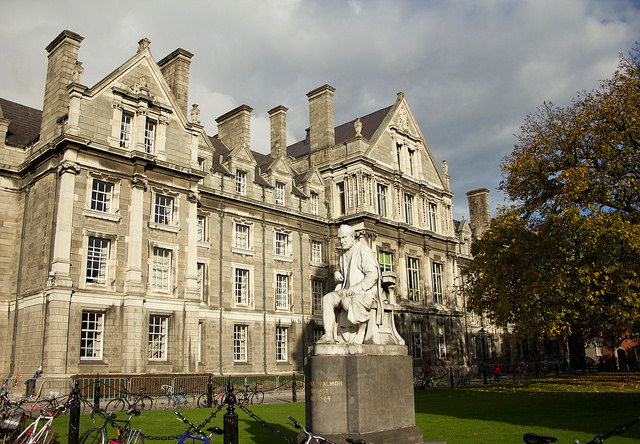A clash between the College Historical Society (the Hist) and the Examinations Office has revealed a College clutching for all the spare space it can during exam season.
At a meeting on January 10th between two of Trinity’s largest societies, the Central Societies Committee (CSC) and a host of College staff members, including Bursar Veronica Campbell, Trinity admitted that it is facing severe pressure to find locations for annual examinations.
The memorandum of the meeting, obtained by The University Times, reveals that College is considering using the Trinity Technological and Enterprise Campus on Grand Canal Docks as a possible exam location.
In the meeting, it was noted that “the GMB and the Exam Hall are the only two venues available for regular use for examinations”. Speaking to The University Times, the Auditor of the Hist, Paul Molloy, who attended the January 10th meeting, said: “Next year I think the problem will be worse. I don’t have any faith the problem will get better next year.”
Molloy confirmed that Trinity is also considering using the Berkeley Library for exams.
The Graduates Memorial Building’s (GMB) incumbent societies – the University Philosophical Society, the Hist and the College Theological Society – have grown frustrated with what they see as repeated breaches of the College’s agreement over the use of the building. Technically a student space, the GMB has increasingly been seen as a convenient exam space by Trinity.
The longstanding agreement states that “every effort will be made to reduce the College’s dependency on the use of the Debating Chamber as an examination venue, specifically outside of peak examination periods, and only in exceptional circumstances for small groups”.
“Both sides acknowledge that progress on this may be limited pending availability of new and appropriate examination accommodation on or adjacent to campus”, it states.
Even as the Trinity Education Project promises a revolution in how students take exams – sitting fewer exams split into two sets, Christmas and summer – concerns are still high about the lack of permanent, dedicated spaces for testing students.
While Molloy said that he thinks College will ultimately stick to the agreement with the GMB following January’s meeting, he remains sceptical about whether the education project will reduce the number of exams, as promised.
If the problems continue, he said, it “will impact quite a lot on the ability of societies to run full-day events”, such as the Trinity Arts Festival. It all “depends on form of assessments that are introduced to replace exams”, said Molloy.
The demolition of Luce Hall in early 2016 robbed the Examinations Office of a dedicated exam space on a campus that has few student spaces. There is no guarantee that there will be any space for exams in the new Business School.
The redevelopment of South Leinster St has also been a blow to the Examinations Office, which every Christmas has to juggle dates, times and locations for hundreds of exams. Last year, the area was refurbished for computer science students.
In an email statement to The University Times, Campbell said: “As part of the estates strategy an audit of teaching spaces was recently undertaken and it highlights that steps need to be taken to more effectively match room bookings with the associated occupancy and activity. This is relevant to both teaching activities and examinations.”
“I anticipate that better visibility of teaching spaces and their utilisation will contribute to improvements in room allocation and this will be of benefit to many areas of College, including the Exams Office”, she added.
Yet the exchange between Trinity’s societies and senior College staff reveals something of the knowledge gap that contributed to heated exchanges between Molloy and Katherine Lyons, who organises Trinity’s exams, in December.
According to the memorandum, Lyons was unaware of the GMB’s agreement that the use of the debating chamber was made subject to allowing the societies to use it on Monday, Wednesday and Thursday evenings. Lyons said she would “endeavour to respect this in line with the GMB agreement”. Both the Phil and the Hist have held debates in the chamber every week on the same day for years.
In an email sent by Molloy to the College Secretary, John Coman, in December and obtained by The University Times, he said that the GMB had been “sporadically closed off for access to the Ordinary Members of the society” during exam season, while committee members had been denied access.
At the January meeting, College officials said they wouldn’t support creating a dedicated examination hall in Trinity at the current time, instead putting their faith in Trinity’s Estates Strategy – a College-wide survey of Trinity’s spaces and properties. “Underutilised current spaces may come to light at the completion in the course of the Estates Strategy analysis”, the memorandum notes.







